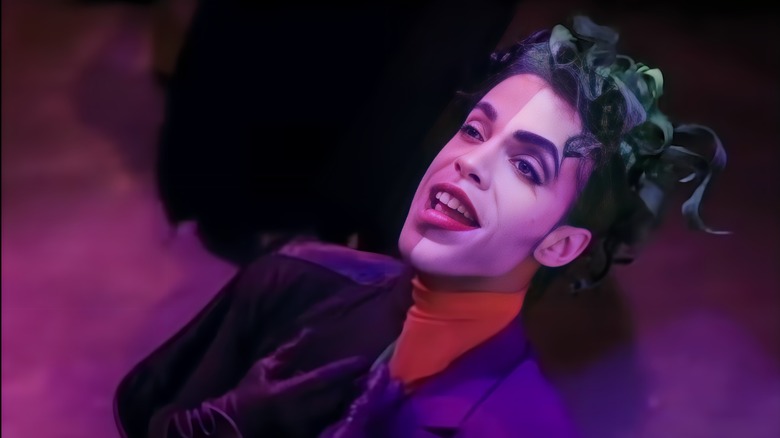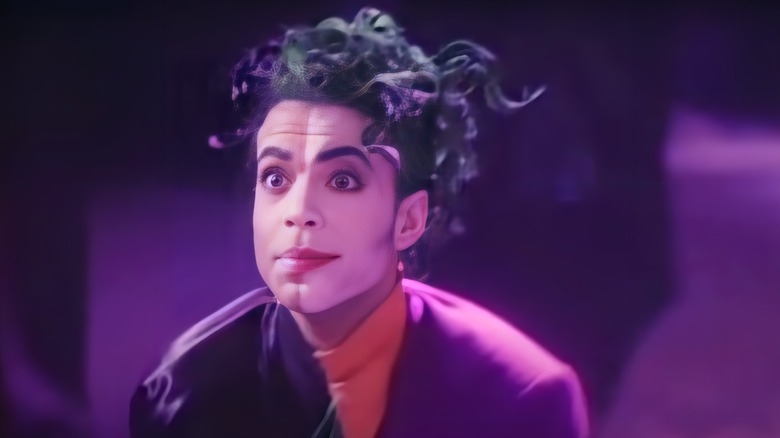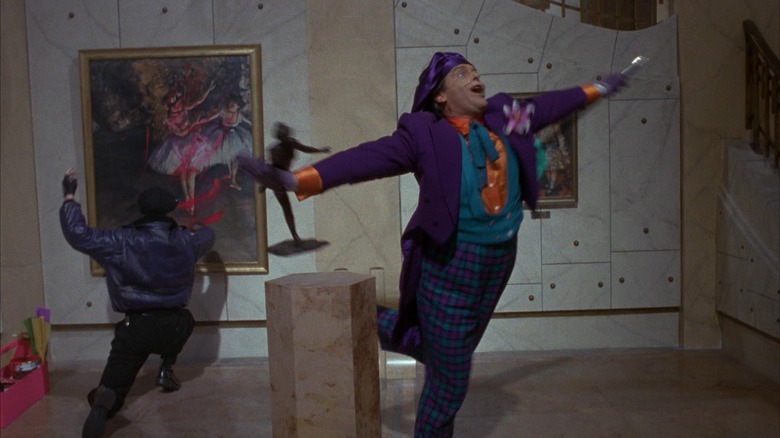Batman's Producers Tried To Force Danny Elfman To Co-Write The Score With Prince
Back in 1992, Tim Burton stated openly that he loved Prince and was lucky enough to have seen His Royal Badness in concert a few times. This sentiment is shared by any human being alive, as Prince is one of the most exhilarating pop stars to have ever lived. Burton's penchant for Prince, however, wasn't something that he wanted to be reflected in his 1989 film "Batman." Burton had already worked with composer Danny Elfman of Oingo Boingo on 1985's "Pee Wee's Big Adventure" and 1988's "Beetlejuice," so he already knew what sound he wanted for "Batman" and who could provide it. It was the studio, Warner Bros., that wanted more hot pop songs on the soundtrack, and it was executives that shopped the project to whatever hip musicians would listen.
In an interview included on the "Batman" DVD, Burton admitted that pop songs were kind of anathema to what he wanted. The aesthetic of "Batman" is very expressionistic and industrial, with impossible spires taken from Fritz Lang's "Metropolis" towering over moist alleyways straight from film noir. He clearly wanted "Batman" to look timeless, able to take place anywhere from 1939 to 1989. Prince songs on the soundtrack screw the film down to a specific era.
The studio eventually got their way, and original Prince songs like "Partyman" and "Trust" appeared in the film. The studio might have loused up Burton's vision, but they became rich as a result; the "Batman" soundtrack sold like bat-shaped hotcakes. Danny Elfman's score, meanwhile, released as its own album, also did quite well. Odd that the two albums, which sound so different, should come from the same source.
In a recent video interview with GQ, Elfman revealed that he was once asked to write his score with Prince.
He said no.
Spoil the Partyman
Elfman revealed that he was intimidated enough by "Batman." By 1989, he had already worked on multiple mainstream studio films including "Back to School," "Midnight Run," and "Scrooged," so he was quite used to working in the studio system, but "Batman" was a few steps beyond. This was to be a summer tentpole to end all summer tentpoles, and Elfman felt the pressure. He also received a lot of studio notes. Evidently, the primary mandate was that the "Batman" score could not resemble the score of the 1978 "Superman" film. Elfman said:
"I've never done anything harder than 'Batman' because, first off, I had to prove myself. [I]t's like, 'Okay, he's the quirky comedy guy,' and here I am doing this Batman movie. Understandably, I think they were like, 'Uh, we need somebody who knows how to do this kind of music.' But nobody knew what kind of music it was. There really was no superhero music. There was just 'Superman.' And we said, 'We know we don't want it to be Superman, John Williams.'"
Beyond that, the studio said they might require something ... poppier. Elfman's scores tend to feature quirky, baroque melodies. A lot of Elfman's "Batman" score owes an aural debt to Igor Stravinsky's "The Firebird Suite." Stravinsky clearly didn't have the pizazz the studio wanted. Elfman was offered a chance to collaborate with Prince. As Elfman put it:
"[T]here was an element with the producer in the studio of wanting it to be a pop score. There was definitely this moment of like, 'Danny, we want you to collaborate with Prince and co-write the score.' And I go, 'I can't do that.'"
Yes, he turned down working with Prince.
The Prince and the Elf(man)
One might immediately feel ambivalent. Fans of Burton's film will likely be glad Elfman was able to construct his score the way he did. On the other hand, having two rock icons like Prince and Elfman working together might have produced some amazing music. Never mind that it's hard to imagine with Prince's soul/funk rhythms would sound counterpoised against's Elfman's carnival-like Boingo tunes. Elfman addressed his refusal, saying:
"People go, 'You really said that?' I love Prince, but not for that score. I already knew what the score was, and I knew that if I collaborated, he'd be writing tunes, I'd be orchestrating his tunes, and I would be essentially a glorified arranger rather than a composer. Because he was world-famous, and I was still nothing. I had to walk away. I was so depressed. I felt like I just blew up my own career."
Elfman's integrity stung for a few weeks. If this was the end of his career — a refusal to work with Prince — he would regret it forever. Luckily, he only regretted it for a few weeks, as Elfman eventually received the phone call allowing him to compose music in a more comfortable idiom.
"[A] month later I got the call saying, 'Danny, you're back. We gotta get moving. Come on, come on.' It's like [exhale] this gamble paid off. But it was a miserable period of time."
Shortly after the film came out, both Prince and Elfman were celebrated for their albums, and both remain well-regarded pieces of pop media. The gamble paid off indeed.


